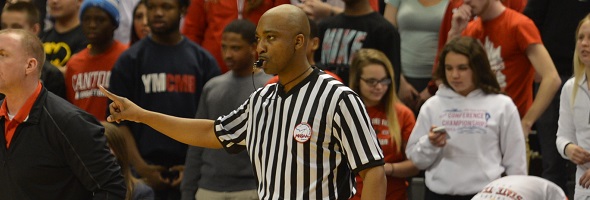
Be the Referee: Cheer Safety
February 17, 2016
This week, MHSAA assistant director Mark Uyl explains how rules in competitive cheer keep Michigan's athletes as safe as possible.
Be The Referee is a series of short messages designed to help educate people on the rules of different sports, to help them better understand the art of officiating, and to recruit officials.
Below is this week's segment - Cheer Safety - Listen
Cheerleaders – usually at the college level - get in the sports headlines whenever an accident occurs causing a serious injury. In Michigan, the sport of Competitive Cheer doesn’t make the news in that regard.
Why? Because this sport, created by Michigan schools, has built in safety guidelines for competition, including the proper matting, rules which prohibit dangerous stunts, and safety judges observing the routines whose responsibility is to detect, record and report safety violations when they occur and to penalize those who commit them.
This format is exclusive to Michigan and just another way that high school sports take the extra step to make the games our children play as safe as they can possibly be.
Past editions:
Feb. 11: Primary Areas - Listen
Feb. 4: Block/Charge Calls - Listen
Jan. 28: Dive on the Floor - Listen
Jan. 21: Hockey Officials' Options - Listen
Jan. 14: Recruiting Officials - Listen
Jan. 7: Wrestling Weight Monitoring - Listen
Dec. 31: Respect for Referees - Listen
Dec. 24: Basketball Instant Replay - Listen
Dec. 17: Basketball Communication - Listen
Dec. 10: Basketball Excessive Contact - Listen
Nov. 26: Pregame Communication - Listen
Nov. 19: Trick Plays - Listen
Nov. 12: 7-Person Football Mechanics - Listen
Nov. 5: Make the Call: Personal Fouls - Listen
Oct. 29: Officials Demographics - Listen
Oct. 15: Make the Call: Intentional Grounding - Listen
Oct. 8: Playoff Selection - Listen
Oct. 1: Kick Returns - Listen
Sept. 24: Concussions - Listen
Sept. 17: Automatic First Downs - Listen
Sept. 10: Correcting a Down - Listen
Sept 3: Spearing - Listen
Aug. 27: Missed Field Goal - Listen

See the Whole Play
August 19, 2014
Here are a few more pearls of wisdom from the nation’s leading gathering of sports officials, these from Barry Mano, NASO president:
- “Incorrect no-calls are easier to explain than incorrect calls.”
- “Officials are to enforce, not appease.”
- “In spite of their criticisms, there is no sensible parent who would want their child to participate without officials.”

